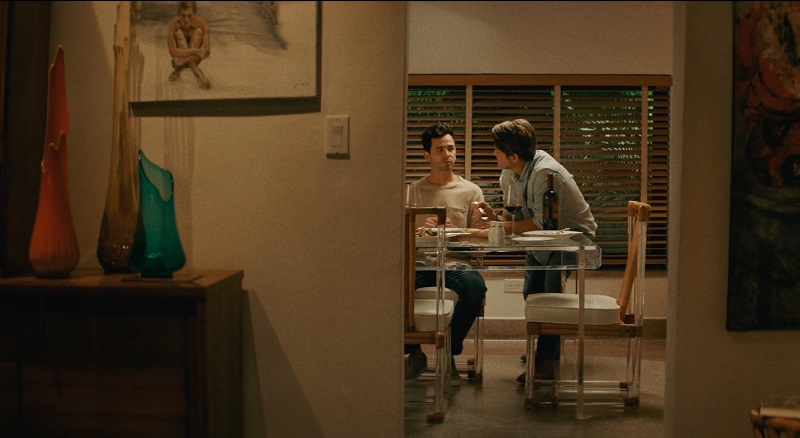Borrowed (Betancourt and Ortega, 2022)
Borrowed is one of those gay films that avoids using the word “gay” too frequently in its press materials but which announces its orientation pretty clearly in its opening scenes. One male character paints male figures and scans phone images of shirtless dudes on his phone while the other applies eye-liner with the sure hand of an old pro.
The former is David (Jonathan Del Arco), and the latter is Justin (Héctor Medina). In the opening, Justin agrees to pose for David, but the banter between the two skews more like a date than a job interview. David has an isolated shorefront home in Florida, and after he excuses himself to dispose of a raccoon caught in a spring trap, the tone of their interactions abruptly shifts. Justin tries to excuse himself but David won’t let him leave. Justin trashes the studio and David looks on with…lust… curiosity….indifference?
Borrowed is based on a stage play of the same name, and it is about the end of the first act that things grind to a halt right when you would expect a psychological thriller to become tenser. The best that I can articulate the problem as a straight reviewer looking at gay characters, is that Justin’s motivations and attitudes towards David are so obscure that the viewer is left with little choice but to wait for the film to decide for itself whether it is curiosity, obsession, or shrewd survivalist compliance. At times Justin is handcuffed naked in a bathtub while David gently but creepily washes his body. At others times Justin poses freely, swims in David’s pool, and shares openly about early sexual experiences. But then a knock on the door or a random passerby will set Justin off to trying to escape and flip David’s switch from wooer to captor.
It doesn’t help that there have been other, better movies that have more coherently explored the territory between grooming and loving. Ozon’s Summer of 85 and By the Grace of God come to mind. Call Me By Your Name presented a gay relationship in the context of power imbalances (in that case because of age) in a way that might challenge straight readers to consider whether such behaviors were only wrong (or thought wrong) in a gay context.
Borrowed, on the other hand, wants to somewhat excuse David, and that’s a hard ask of this reviewer. Co-director and co-writer Oscar Ernesto Ortega admits in the press kit that the transformation from play to film came with a shift in emphases from thriller to “drama.” He said, “Having a character with a deep trauma on his past was extremely important to somehow justify the result of his actions so that the audience could empathize with him.” Past trauma as the key to understanding cruel behavior is problematic — doubly so when it is asked to explain cruel gay characters. I say this because straight viewers have been told for a generation now that gays are born not made, and thus when the world posits abuse or trauma as contributing factors to gender identity, we are told that this is not only wrong but offensive. Similarly, if a film were to ask the audience to forgive a straight abuser on the grounds of past trauma, I can only imagine how that would play alongside films like She Said, Women Talking, or Room.
That’s not to say there can’t ever be truth revealed through films that run thematically counter to pervasive contentional wisdom. It’s just that they are usually far bolder in their messaging in all the spots where Borrowed hedges its bets. “What do you think this is?” David yells in a key exchange. He insists that it is not a “kidnapping,” nor is it a “game.” But since when does the abuser get to dictate for the audience and the victim the limits of when victimization is real and when it is misdirected love borne from one’s own inner demons?

